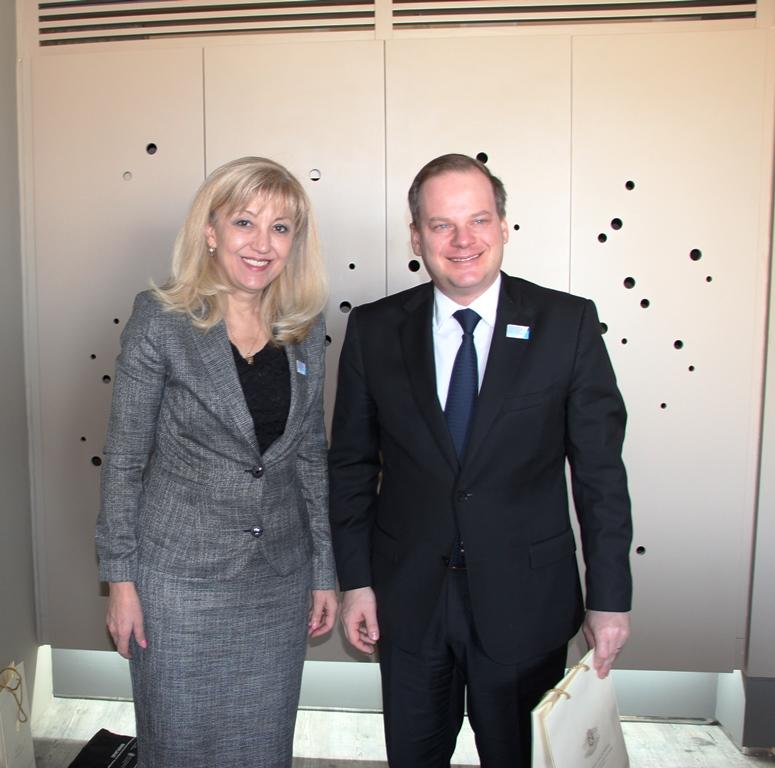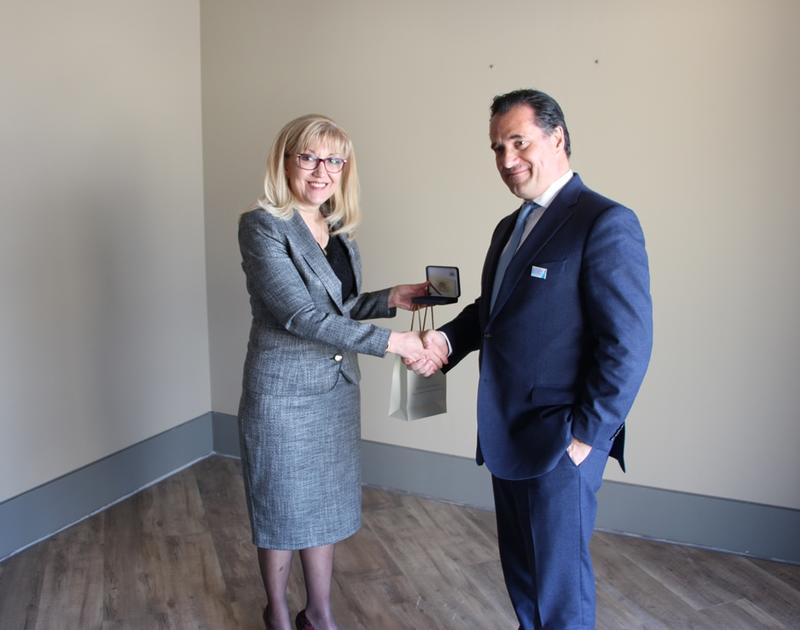More than 175,000 Greek vehicles have bought an e-vignette since the system was launched
More than 175,000 Greek vehicles have bought an e-vignette since the system was launched
By Ministry of Regional Development and Public Works
More than 175,000 Greek-registered vehicles that have passed through the five border checkpoints between Bulgaria and Greece have bought an electronic vignette since its introduction. Nearly 20,000 of them are heavy-load vehicles and trucks. This was announced by the Minister of Regional Development and Public Works - Petya Avramova - during a bilateral meeting with Kostas Karamanlis – Minister of Infrastructure and Transport of the Hellenic Republic during the Fourth Meeting of the High Level Cooperation Council between the governments of the two countries. Minister Avramova reported that Greek vehicles rank third in the number of all vehicles with foreign registration – after those from Turkey and Romania. She reminded that in order to facilitate the travel of Greek citizens at the border checkpoints with Greece, an information brochure in Greek on the applicable rules for travel with electronic vignettes on the national road network in Bulgaria has been distributed.
The Regional Minister informed her Greek counterpart that from March 1, 2020, road vehicles weighing over 3.5 tons, which travel on paid sections in Bulgaria, will pay a toll for their use. She provided Minister Karamanlis with detailed information on the toll system, and he undertook to disseminate it to the business community and branch organisations of Greek carriers. Avramova added that an information brochure on the toll system, the ways of charging and control has been prepared, it has been translated into Greek and will soon be available at the border checkpoints.
Minister Avramova and Minister Karamanlis discussed a wide range of issues related to economic development, transport connectivity and other subjects of mutual interest. They both stressed that our countries have good cooperation in the field of energy, tourism, cultural exchange, building transport links.
“For us the main priority is the implementation of the gas interconnector between Bulgaria and Greece in view of our desire to diversify gas supplies and achieve energy security in the Balkans, as well as the completion of pan-European transport corridors in Bulgaria and related arterial roads,” Minister Avramova pointed out. She noted that Bulgaria continues to work on the Struma Highway, part of Corridor No. 4, which is the shortest route between Western and Central Europe and the White Sea, and on the Vidin-Botevgrad vertical connection, which is part of the same route. “With their completion, the travel from Romania to Greece by highway and expressway will be achieved,” Avramova said. She added that our country is actively working on the construction of highways “Ruse-Veliko Tarnovo” on Corridor No. 9 and Europe Motorway, part of Corridor No. 10. These projects will improve connectivity in the region and will open up wider opportunities for business, investment and tourism. “Greek construction companies are welcome to implement majour infrastructure projects. We expect the Bulgarian companies that want to invest in Greece to be treated equally in their participation in tenders for strategic projects, including in the energy field,” Petya Avramova said.
For his part, Minister Costas Karamanlis informed that Greece continues to expand and improve road relations with Bulgaria, as important axes for the economic development. The busiest section, Promahon-Serres, where the traffic from the Kulata border checkpoint runs, has already been completely renovated. A new road to Mandra and 4 important road junctions are to be built in the area. He noted the importance of continuing to develop the transport and railway network between the two countries in order to further promote bilateral co-operation.
Minister Petya Avramova also met with Adonis-Spyridon Georgiadis – Minister of Development and Investment of the Hellenic Republic. She discussed with him the promotion of territorial cooperation as a tool for achieving economic, social and cultural cohesion, as well as for improving connectivity. She noted that a key project under the INTERREG V-A Greece-Bulgaria 2014-2020 Cross-Border Cooperation Programme is the construction of a new border checkpoint between Bulgaria and Greece near the cities of Rudozem and Xanthi, which will provide additional opportunities for bilateral relations, business and tourism. It is expected to improve the socio-economic situation of the South Central region in Bulgaria. Minister Georgiadis also pointed out that the border checkpoint is very important for the development of the region and that it will contribute to the development of tourism. He noted that Greece is visited by 1.5 million tourists from Bulgaria annually.
The two ministers also discussed the future Greece-Bulgaria cross-border co-operation programme 2021-2027. Minister Avramova said it should focus on the potential and needs of border regions. “We propose that up to 30% of the budget of the future programme be focused on strategic projects, taking into account cross-border connectivity and transport links between the countries and emphasising the development of rail transport. An analysis and specific proposals for strategic projects are to be made,” she said. The other proposal is to set up a Small Projects Fund as a tool to promote the economic growth of small and medium-sized enterprises in the border area. Minister Georgiadis assured that Greece will support this proposal, because he believes that supporting small and medium-sized businesses is very important for the border areas.
They also discussed the future European programme for transnational cooperation Interreg Euro-Mediterranean area 2021-2027 (EURO MED), which will replace the Transnational Cooperation Programme “Balkans - Mediterranean” 2014-2020 and the programme “Southwest Europe” 2014 - 2020. Minister Avramova stated that it is important for Bulgaria to receive the support of Greece for the new programme to cover the entire territory of the country. Bulgaria encourages the inclusion of small and medium-sized enterprises as direct beneficiaries through the implementation of the new Small Projects Fund instrument. “Last but not least, given the termination of the two transnational cooperation programmes and the expansion of the eligible territory, a budget should be provided in line with the expected high interest in the future programme,” she said.






